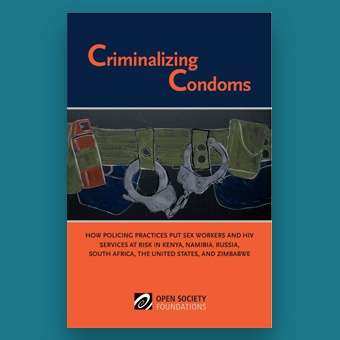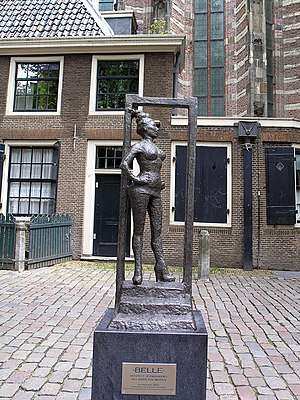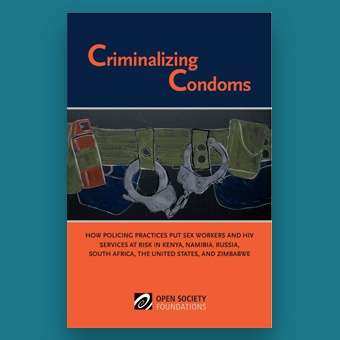NEW YORK, July 17, 2023 /PRNewswire-USNewswire | New research from six countries found that stop-and-search practices by the police are making sex workers less likely to carry condoms, said the Open Society Foundations today.
The report, “Criminalizing Condoms,” surveyed sex workers in Kenya, Namibia, Russia, South Africa, the United States, and Zimbabwe and found that police practices made it more likely that sex workers would have unprotected sex with their clients. Condom possession is used by some prosecutors as evidence of criminal activity.

Criminalizing Condoms: How Policing Practices Put Sex Workers and HIV Services at Risk in Kenya, Namibia, Russia, South Africa, the United States, and Zimbabwe
The law enforcement practices documented in the report fly in the face of government programs aimed at preventing the spread of HIV.
“While one arm of government works to get condoms into people’s hands, another is taking them away,” said Heather Doyle, Director of the Sexual Health and Rights Project at the Open Society Foundations.
Among the report’s key findings are:
- In South Africa, 80 percent of sex workers said they had been intimidated or harassed by police for being a sex worker or doing sex work.
- In Zimbabwe, 85 percent of sex workers said they had been extorted by police.
- In Russia, 80 percent of sex workers said police had taken their condoms.
- In Namibia, 50 percent of sex workers said police destroyed their condoms and 75 percent of those who then did sex work had unprotected sex.
- In Russia, 60 percent of sex workers said police had used condoms as evidence against them.
- In the United States, 52 percent of sex workers said there had been times when they opted not to carry condoms because they were afraid it would mean problems with the police.
- In Kenya, 50 percent of outreach workers said that police had harassed them during the course of their outreach work.
More than 40 percent of sex workers surveyed reported that police had taken condoms from them; in Russia, that figure rose to 80 percent. In some locations sex workers reported that police have destroyed condoms with scissors, set them on fire, and even ran over condoms with their vehicles.
These actions have dire consequences for sex workers’ health. In Namibia, 50 percent of sex workers surveyed said police destroyed their condoms and 75 percent of those who then did sex work had unprotected sex. Fifty-two percent of survey participants in the United States said they sometimes opted not to carry condoms because of stop-and-search practices.
Police also use condom possession to justify detaining or arresting people on charges related to sex work. The criminalization of sex work and use of condoms as evidence make sex workers particularly vulnerable to police abuse. The report found that police in all six countries harass and physically and sexually abuse sex workers who carry condoms. Arrest on the grounds of condom possession is used to extort and exploit sex workers.
“Again and again sex workers have told us that they are afraid to carry condoms because they worry it will mean being harassed or arrested by police,” said Doyle. “The police are punishing people for doing the right thing, for carrying condoms and trying to protect their health.”
At the 19th International AIDS Conference to be held on July 22-27 in Washington, D.C., the Open Society Foundations, Human Rights Watch, and sex worker rights groups will raise the issue of condom confiscation with delegates and call on health professionals, scientists, and policymakers to support decriminalization of sex work and an end to confiscation of condoms by police.

The Open Society Foundations work to build vibrant and tolerant democracies whose governments are accountable to their citizens. Working with local communities in more than 100 countries, the Open Society Foundations support justice and human rights, freedom of expression, and access to public health and education.
CONTACT: Paul Silva, +1-212-548-0309, psilva@sorosny.org
Related articles
- Indoor sex workers face less violence, exposure to HIV, says new Vancouver study (vancouversun.com)
- New York City Police Targets Sex Workers For Carrying Condoms Despite High Rates of HIV Infection (thinkprogress.org)
- I am not a sex worker rights activist I am just a sex worker (missblackcallgirl.wordpress.com)
- Police Routinely Confiscate Condoms from Sex Workers, Increasing HIV Risk Says Open Society Foundations - Condom Possession Is Used by Some Prosecutors as Evidence of Criminal Activity (appablog.wordpress.com)
- Sex workers cry foul over booklet (nzherald.co.nz)
- Op-Ed Contributor: Distributing, Then Confiscating, Condoms (nytimes.com)
- Privilege Sex Work and Survival Sex Work pt 1 (missblackcallgirl.wordpress.com)
- Sex education through ‘SMS’ begins (thehimalayantimes.com)
- The girls are in control (thehindu.com)
- Privilege Sex Work and Survival Sex Work pt 2 (missblackcallgirl.wordpress.com)
- Indoor sex work is safer than the streets: report (windsorstar.com)





